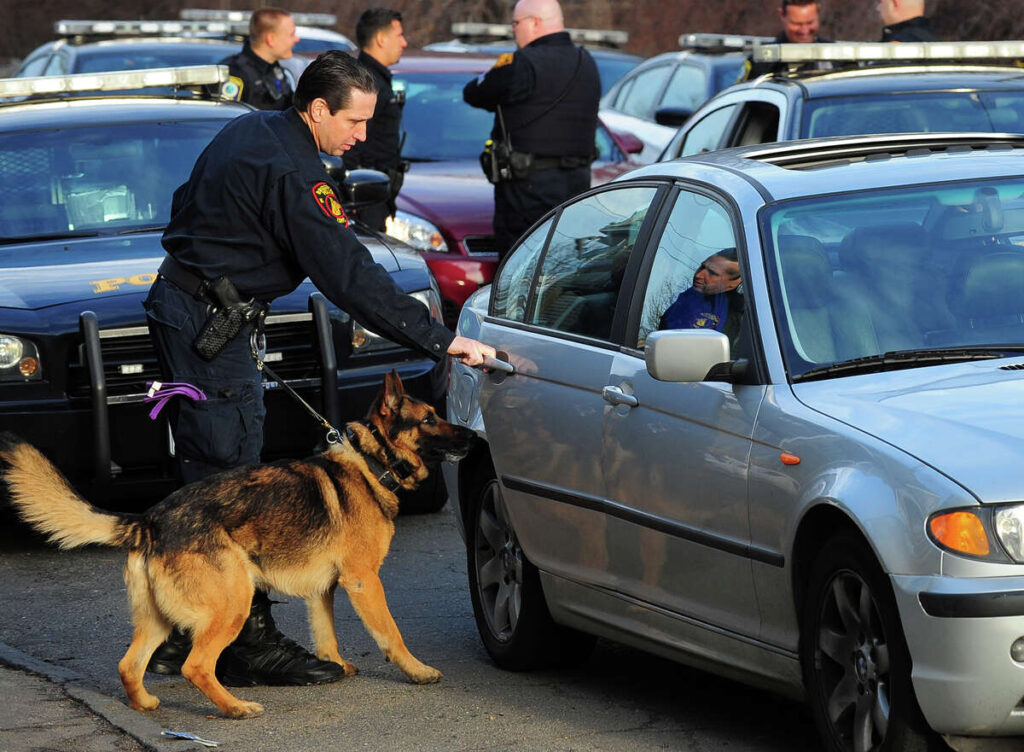File photo of a Bridgeport police K9 searching a car for drugs in 2015. Many departments are no longer using K9s in vehicle stops following the legalization of cannabis unless officers see what could be other drugs in the car.
With recreational cannabis use now legal for adults, many law enforcement agencies in southwestern Connecticut are no longer bringing pot-detecting police dogs to sniff out drugs around vehicles during car stops, officials said.
In Monroe, the police department decided not to replace a retired police dog after the legalization of cannabis reduced its role in vehicle searches. Meanwhile, Stratford police expect to replace its two K9 dogs with those specializing in searching for missing people once they retire, spokesman Capt. Frank Eannotti said.
The two dogs, a Belgian malinois and a German shepherd, are trained to sniff out marijuana and narcotics, including heroin and cocaine.
Connecticut law also still prohibits selling marijuana without a license. Still, Stratford police are no longer deploying its K9s for drug searches, Eannotti said.
“There’s lines to be crossed now. So you gotta watch out for that,” he said.
Police dogs are typically trained to sniff out multiple drugs, but they are unable to change how they alert handlers based on what they smell, officers said.
“It’s not like if he puts his left paw it’s cocaine, if he puts his right paw it’s marijuana,” said Lt. Pat Lynch, who oversees Ansonia’s police patrol officers.
Without that distinction, police would not have enough probable cause to search a vehicle for drugs even if a K9 alerts its handler, he said.
“It basically goes back to the Constitution and Fourth Amendment,” said Lynch, referring to the constitutional protection against unreasonable searches and seizures. “The dog just indicates saying, ‘OK, there’s drugs.’ I don’t know what kind of drugs there are.”
To adapt to the change, Ansonia police are no longer routinely bringing its German shepherd around a vehicle while they check a driver’s license and registration. But they would still use the dog for vehicle or home searches with a warrant, Lynch said.
In addition, Ansonia police are still deploying the K9 to recover evidence like a suspect’s handgun and use its sense of smell to track wanted and missing persons.
Since Ansonia has a small law enforcement agency, its K9 handler also answers calls and makes car stops, bringing the dog with him.
“If he sees a motor vehicle violation, he’ll stop it. If he’s on patrol with another officer who stops the car and he’s the closest car, he’ll go and he’ll provide a backup to the officer that makes a stop,” Lynch said.
Two of Westport police’s dogs, a Belgian malinois and a Dutch Shepherd-crossbreed, are drug-detecting dogs trained in sniffing out marijuana and are no longer walked by handlers around cars during a stop, said spokesman Lt. Eric Woods. But if police spot possible illicit drugs or paraphernalia inside a vehicle, they would use the dogs to search it, Woods said.
“Let’s say the car that was stopped, the cop sees white powder, or sees cocaine, or sees heroin needles or sees something else that would indicate that there’s drugs in the car that is not marijuana,” Woods said.
But another younger, drug sniffing Belgian malinois isn’t trained to detect marijuana. Unlike the older K9s, Westport police still use this dog to sniff around a vehicle and consider its alert enough probable cause to conduct a search.
“I think it’s gonna come down to, as dogs get retired, and they start training new officers and handlers, you just don’t introduce marijuana into the mix,” Woods said.
In Bridgeport, three officers are training to become K9 handlers. The dogs they will oversee won’t be trained in sniffing out drugs, but they are hoping to have them “cross-trained” to detect narcotics in the future, said Lt. William Simpson, who oversees Bridgeport police’s K9 handlers.
“How long do we want to take a random K9 off the road to get that training? So really it’s gonna boil down to manpower issues,” Simpson said.
Along with drug dogs, some police departments also have K9s specialized in bomb-sniffing and emotional support. Simpson said he hopes the department will replace its retiring explosives-detecting dog, but added they also help protect the city’s ferry terminal and other critical infrastructure from bomb threats. Simpson also said Bridgeport police is considering taking in an emotional support dog.
But the department’s ability to take in the dogs would be dependent on whether it can resolve its manpower shortages, he said.
While the city is making efforts to fill vacancies, the mayor’s budget calls for fewer officers in the department overall.
H/T: www.ctpost.com



